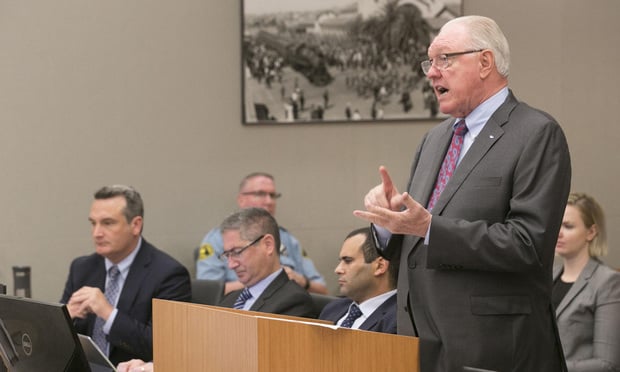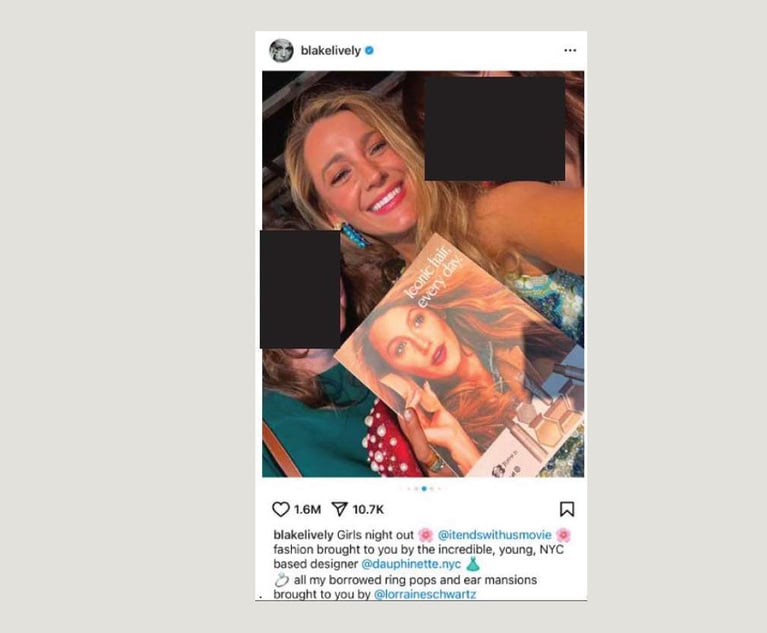In GirlsDoPorn Trial, Jane Doe Law Grad Emerges as Central Figure
As trial in the fraud suit against GirlsDoPorn.com gets underway, the defendants describe Jane Doe No. 1, now graduated from law school, as the "ringleader" of 22 former actresses who are suing the adult film site.
August 21, 2019 at 02:00 PM
10 minute read
 Plaintiffs attorney Ed Chapin gives his opening statement on Aug. 20 in the civil suit of 22 women against defendant girlsdoporn.com who say they were coerced into taking parts in filmed sex scenes under false pretenses. (Photo: John Gibbins/The San Diego Union Tribune)
Plaintiffs attorney Ed Chapin gives his opening statement on Aug. 20 in the civil suit of 22 women against defendant girlsdoporn.com who say they were coerced into taking parts in filmed sex scenes under false pretenses. (Photo: John Gibbins/The San Diego Union Tribune)GirlsDoPorn.com was asking for trouble when it recruited a law student to appear in its adult videos.
As trial opened Tuesday in the San Diego case of 22 women who allege they were duped into making widely distributed online pornography videos, a woman identified in court only as Jane Doe No. 1, a law school graduate, was the center of attention.
One of the few things plaintiff and defense counsel agreed on Tuesday was that Jane Doe No. 1 helped organize the plaintiffs, on the theory that the porn companies had misled them into believing their videos would be distributed only on DVDs, outside the U.S. Instead, they allege, their videos appeared on GirlsDoPorn.com and other websites, and their names and other personal information appeared on a site called Porn Wikileaks.
“This is all part of the business model” of GirlsDoPorn, which touts ordinary young woman having sex on video for the first time, plaintiffs attorney Ed Chapin of Sanford Heisler Sharp said during opening statements. Publicizing names and video excerpts drives traffic to GirlsDoPorn’s paid website.
Jane Doe No. 1 used Porn Wikileaks “as a phone book to be able to contact other people,” Chapin explained. “She found evidence of a scheme dating back to 2009.”
She has since graduated and passed the bar exam. But “she doesn’t want to be a lawyer,” Chapin said. She doesn’t want to hear opponents or others say, “she’s the one who did the porn video.”
The 22 plaintiffs contend that GirlsDoPorn recruited them using modeling advertisements on Craigslist, flew them to San Diego, and then directed employees and women masquerading as former actresses to falsely assure them the videos would never go online. The plaintiffs’ first witness, Amberlyn Clark, testified Tuesday that the company paid her hundreds of dollars to provide such false assurances.
But a lawyer for GirlsDoPorn’s parent company, BLL Media Inc., said the women signed written contracts permitting unlimited distribution of their likeness “throughout the world in perpetuity, without limitations.” Aaron Sadock of Panakos Law played a mashup of videotaped statements from various plaintiffs orally confirming that they were relinquishing “all rights whatsoever to the footage” and that “anything contained in the footage may be used however BLL Media chooses.”
Of all of them, Jane Doe 1—who according to Sadock had studied contracts for two semesters by the time she signed her agreement—should have appreciated the enforceability of a written contract.
“A lot of money is spent in recruiting someone like Jane Doe 1,” he said. “A contract like this seeks to ensure that someone doesn’t file a lawsuit like this.”
He denied that GirlsDoPorn or anyone associated with it disclosed the actresses’ names. The company takes active steps to protect identities, in part to assist with future recruiting. “Part of the business model is doing the exact opposite of what plaintiffs say” the company is doing, he said.
But it can’t always control internet trolls—or, in the case of Jane Doe No. 1, what he described as her 14,000 followers on social media. Any one of them could have recognized her from her film and spread the news through her network, he said. Describing her as “the ringleader of this case,” Sadock said Jane Doe 1 chose voluntarily to act in the films to finance “a very expensive lifestyle” that involves private jets and trips to Las Vegas. “Now she regrets it,” he said.
Doe v. GirlsDoPorn.com is being tried to Superior Court Judge Kevin Enright. He remained poker-faced throughout the proceedings, even when NSFW photos from the GirlsDoPorn website were flashing on his computer monitor. Other than refereeing the parties’ objections, he didn’t ask substantive questions during about four hours of opening statements and two hours of testimony.
Plaintiff lawyer Chapin told the judge his clients want compensation for the unauthorized use of their likenesses and for emotional distress; relinquishment of the videos; and disgorgement of ill-gotten gains. At one point he suggested a figure of about $4.8 million. He’s also seeking punitive damages and an injunction that would require, among other things, full disclosure of video distribution plans and legal documents before the company books travel for its recruits.
Chapin said that Michael Pratt and other leaders of GirlsDoPorn targeted vulnerable young women with innocuous modeling ads on Craigslist. When the women responded, the men would offer the prospect of $4,000 for appearing in a 30-minute adult video with a man, and $1,000 for appearing in a solo “toy scene.”
Employees and former actresses—or women pretending to be them—would assure the recruits that the videos would be distributed overseas only, in DVD format, such as to a wealthy individual in Australia, Chapin said. The videos would never go online, and identities would remain anonymous, the women were told. But at the last minute, after having been flown into San Diego, the women would be pressured into signing release contracts they’d never seen before.
“The Jane Does thought they already knew what the deal was, and the defendants did nothing to disabuse them of that,” Chapin said.
This sometimes happened after the Jane Does had been served alcohol or marijuana, he said. He played one videotaped statement in which a tipsy-sounding Jane Doe jokes with the videographer about the claim that she is of sound mind and body.
After the adult videos were recorded, the women would soon find that it did appear online, not only on GirlsDoPorn.com, which is a subscription site, but also advertised on popular free sites such Pornhub.
“The defendants make sure that these videos go viral,” Chapin said. They did that by circulating the videos to the plaintiffs’ social networks, including classmates and professors. “One of them learned about it from their mother, of all things,” Chapin said.
This led to a rain of harassment from friends, acquaintances and complete strangers, making life a “living hell.” When the women pleaded with Pratt and their other contacts to take down the videos, they were ignored. One Jane Doe offered to wire back the money she’d been paid and got no response, Chapin said. Another has had surgery to alter her appearance. “There are women in this case, Jane Does, who have attempted suicide,” Chapin said.
In one instance a plaintiff’s father sought to intervene. According to Chapin, Sadock responded by sending him redacted photos from his daughter’s adult video shoot.
When it was his turn, Sadock said that in hindsight he would have responded differently to the father. He sent the photographs because the father had leveled an accusation of rape, and he wanted to show that the sex in the film was consensual, he said.
Sadock emphasized that all 22 plaintiffs were adults who chose voluntarily to make an adult film with what he said is a legitimate business.
Though 22 sounds like a large number, they represent only “a small sliver” of the 600 actresses who have appeared on GirlsDoPorn. He said the defense will show that the Jane Does engaged in lengthy email correspondence with company owners without expressing concerns about whether the videos would appear online.
Some emailed nude pictures of themselves before any travel arrangements were made or negotiations began. Many appeared in multiple films with GirlsDoPorn and its affiliates, he said.
One plaintiff subsequently participated in a porn video with another company for $200, Sadock said. “I hope we don’t have to go through this video,” he said, warning that it involves “very lewd acts.” After the lawsuit was filed, another plaintiff entered into negotiations to shoot a new porn video with what she thought was a different company. “The only reason we know it, was because it was with us,” Sadock said.
“And then we have the [videotaped] statements,” he said. “They’re not all the joking version.” He proceeded to play a different Jane Doe’s statement, in which she appears to quite soberly acknowledge releasing “all rights to the footage whatsoever.”
“Those statements have nothing to do with a DVD in Australia,” Sadock said. “No one was tricked.”
He said GirlsDoPorn uses industry-standard recruiting practices. “You can’t post ‘porn’” on Craigslist, he said. “You have to post ‘model,’ like everyone in the industry does.”
The same goes for marketing portions of videos on sites like Pornhub. “Like everyone else in the industry, that is part of the revenue model,” he said.
He said GirlsDoPorn’s parent BLL Media actually paid $10,000 to remove its actresses’ names from Porn Wikileaks—”not the opposite.”
“Trolls are a problem for everyone in the industry,” Sadock said. “That doesn’t change the fact that there’s a risk that women who appear in pornographic films will be recognized.”
He told Enright there’s “no middle ground” in the case. If he enforces the written rather than the alleged oral contracts, then GirlsDoPorn should recover its attorneys fees.
Following opening statements, Amberlyn Clark testified that she met and became friendly with GirlsDoPorn actor Andre Garcia while working at a nightclub. Garcia offered her the opportunity to make “a little money on the side” by vouching for the business—telling recruits that the videos “wouldn’t be put online and that they would go to private collectors” outside the United States.
A woman identified only as Jane Doe 15 testified that she was looking for modeling work on Craigslist at age 18 when she came across an ad that linked to the website beginmodeling.com. “I was not interested in doing pornography,” she testified.
➤➤ Cannabis law is going mainstream. To find out what it all means for your practice, check out a new special report on cannabis and the legal industry, and sign up for Higher Law, Law.com’s exclusive weekly newsletter that tracks cannabis practices and the latest regulatory developments.
This content has been archived. It is available through our partners, LexisNexis® and Bloomberg Law.
To view this content, please continue to their sites.
Not a Lexis Subscriber?
Subscribe Now
Not a Bloomberg Law Subscriber?
Subscribe Now
NOT FOR REPRINT
© 2025 ALM Global, LLC, All Rights Reserved. Request academic re-use from www.copyright.com. All other uses, submit a request to [email protected]. For more information visit Asset & Logo Licensing.
You Might Like
View All
Justin Baldoni Sues Blake Lively and Ryan Reynolds for $400M in New Step in 'It Ends With Us' Fight
6 minute read
Patreon Hit With Lawsuit for Allegedly Diverting Subscriber Data to Meta

Music App Denied Injunction Against Apple Over Alleged Scheme to Block Its Access to App Store

$15K Family Vacation Turned 'Colossal Nightmare': Lawsuit Filed Against Vail Ski Resorts
Trending Stories
- 1Paul Hastings, Recruiting From Davis Polk, Continues Finance Practice Build
- 2Chancery: Common Stock Worthless in 'Jacobson v. Akademos' and Transaction Was Entirely Fair
- 3'We Neither Like Nor Dislike the Fifth Circuit'
- 4Local Boutique Expands Significantly, Hiring Litigator Who Won $63M Verdict Against City of Miami Commissioner
- 5Senior Associates' Billing Rates See The Biggest Jump
Who Got The Work
J. Brugh Lower of Gibbons has entered an appearance for industrial equipment supplier Devco Corporation in a pending trademark infringement lawsuit. The suit, accusing the defendant of selling knock-off Graco products, was filed Dec. 18 in New Jersey District Court by Rivkin Radler on behalf of Graco Inc. and Graco Minnesota. The case, assigned to U.S. District Judge Zahid N. Quraishi, is 3:24-cv-11294, Graco Inc. et al v. Devco Corporation.
Who Got The Work
Rebecca Maller-Stein and Kent A. Yalowitz of Arnold & Porter Kaye Scholer have entered their appearances for Hanaco Venture Capital and its executives, Lior Prosor and David Frankel, in a pending securities lawsuit. The action, filed on Dec. 24 in New York Southern District Court by Zell, Aron & Co. on behalf of Goldeneye Advisors, accuses the defendants of negligently and fraudulently managing the plaintiff's $1 million investment. The case, assigned to U.S. District Judge Vernon S. Broderick, is 1:24-cv-09918, Goldeneye Advisors, LLC v. Hanaco Venture Capital, Ltd. et al.
Who Got The Work
Attorneys from A&O Shearman has stepped in as defense counsel for Toronto-Dominion Bank and other defendants in a pending securities class action. The suit, filed Dec. 11 in New York Southern District Court by Bleichmar Fonti & Auld, accuses the defendants of concealing the bank's 'pervasive' deficiencies in regards to its compliance with the Bank Secrecy Act and the quality of its anti-money laundering controls. The case, assigned to U.S. District Judge Arun Subramanian, is 1:24-cv-09445, Gonzalez v. The Toronto-Dominion Bank et al.
Who Got The Work
Crown Castle International, a Pennsylvania company providing shared communications infrastructure, has turned to Luke D. Wolf of Gordon Rees Scully Mansukhani to fend off a pending breach-of-contract lawsuit. The court action, filed Nov. 25 in Michigan Eastern District Court by Hooper Hathaway PC on behalf of The Town Residences LLC, accuses Crown Castle of failing to transfer approximately $30,000 in utility payments from T-Mobile in breach of a roof-top lease and assignment agreement. The case, assigned to U.S. District Judge Susan K. Declercq, is 2:24-cv-13131, The Town Residences LLC v. T-Mobile US, Inc. et al.
Who Got The Work
Wilfred P. Coronato and Daniel M. Schwartz of McCarter & English have stepped in as defense counsel to Electrolux Home Products Inc. in a pending product liability lawsuit. The court action, filed Nov. 26 in New York Eastern District Court by Poulos Lopiccolo PC and Nagel Rice LLP on behalf of David Stern, alleges that the defendant's refrigerators’ drawers and shelving repeatedly break and fall apart within months after purchase. The case, assigned to U.S. District Judge Joan M. Azrack, is 2:24-cv-08204, Stern v. Electrolux Home Products, Inc.
Featured Firms
Law Offices of Gary Martin Hays & Associates, P.C.
(470) 294-1674
Law Offices of Mark E. Salomone
(857) 444-6468
Smith & Hassler
(713) 739-1250






